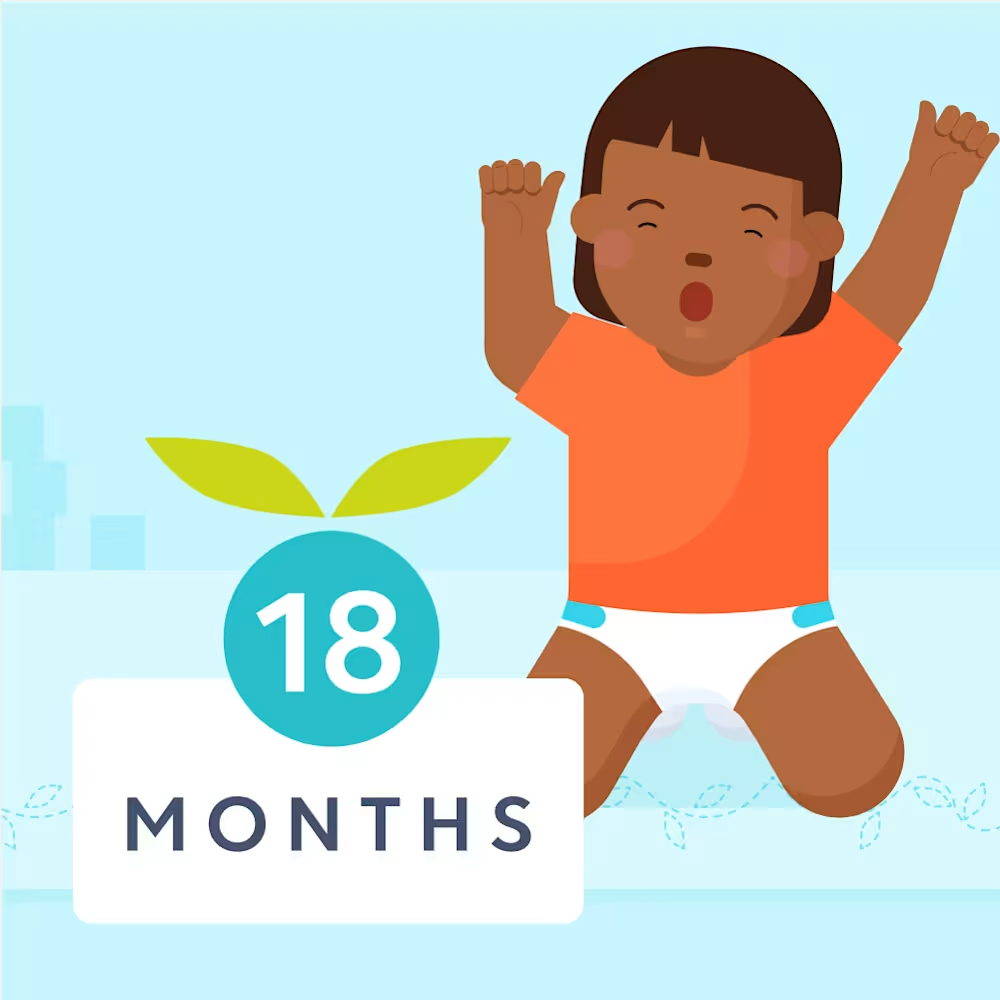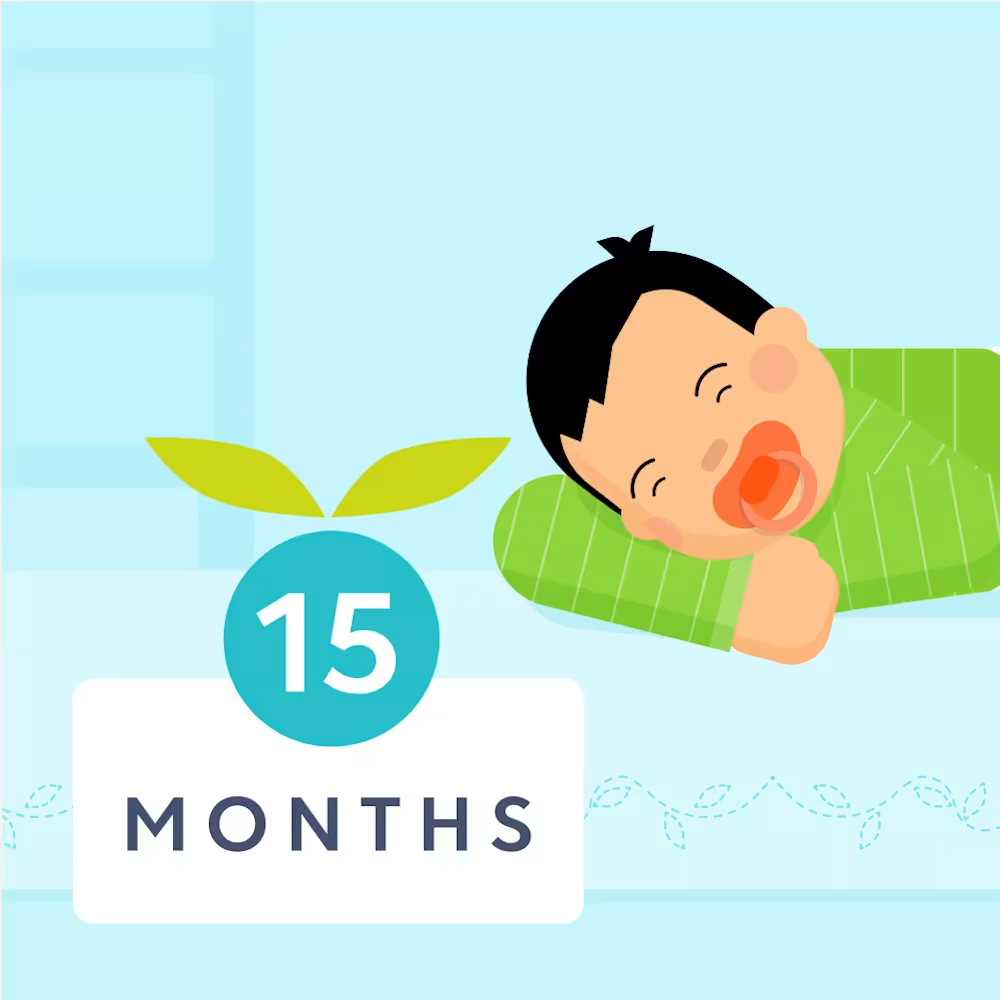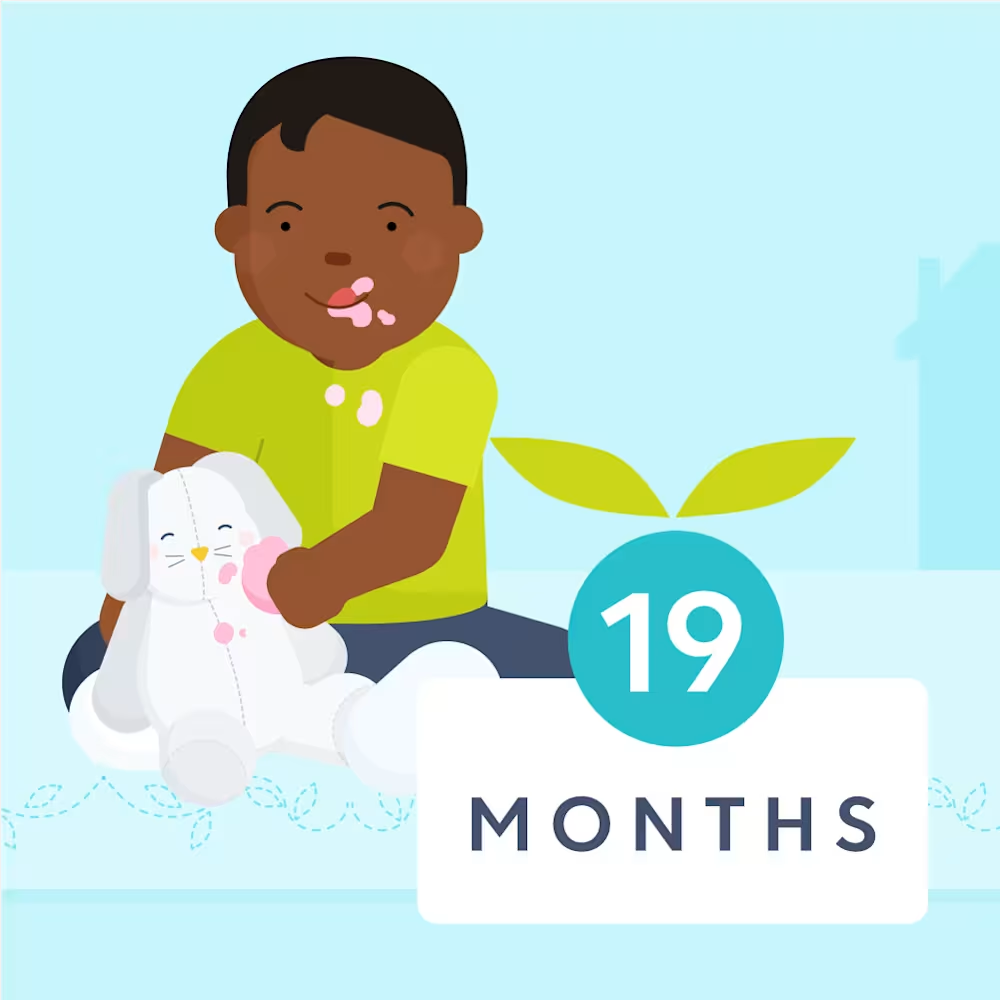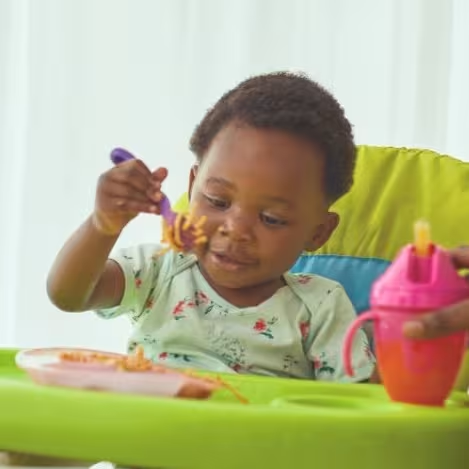18 month old toddler milestones: Development, growth, speech, language
Updated Dec 29, 2025

At 18 months old, your little one is well into their toddler stage. It may seem like they’re gaining new skills every day, and you can’t believe how quickly they’re growing out of being a baby.
In this article, we’ll go over important milestones that your toddler may start reaching as they approach this age – including 18 month speech milestones, language development, emotional development, and gross/fine motor milestones. We’ll also provide a handy 18 month old development checklist that you can refer to and share tips to support your child’s development.
18 month old toddler milestones at a glance
Your 1.5 year old toddler is in a period of development and they may be gaining new skills faster than you can keep track of them. At this age, your child may start to meet new milestones, including:
Development:
Many 18 month olds can walk with no support, and they may even be starting to go up small stairs and climb on and off the sofa. They may start to say a few more words, including a big one at this age – “no.” Toddlers at this age love to play and explore, and most continue to have tantrums.
Sleep:
Most 1.5 year olds need about 13 to 14 hours of total sleep to be well rested, though sleep needs to vary from child to child. at least 11 hours of sleep at night and 1 nap during the day. Typically, children this age need about 5 hours of awake time before bed to be sufficiently tired.
Remember, each child's need for sleep varies, and what's normal and healthy can differ. While these are general guidelines for how many hours of sleep are recommended, it's equally important to pay attention to your child's mood and energy levels. These observations are key in determining their individual sleep needs. Note some children also experience a sudden disruption in sleep around this time, commonly referred to as the .
Feeding:
At 18 months, many toddlers may try to feed themselves using their fingers or a spoon – although their coordination skills aren’t perfect yet. They may also try to drink out of a cup. Many 18 month olds continue to nurse, but they also continue to eat more and more solids. In general, strive for roughly three meals and two snacks per day.
18 month developmental milestones
There are so many exciting developmental milestones to get ready for as your child approaches 18 months.
Physical development at 18 months
Your 1.5 year old’s motor skills are starting to develop rapidly and they start moving around more independently than ever.
Gross motor milestones
Most 18 month old toddlers are in the midst of becoming more and more confident about walking. They may be taking steps without holding onto anything and may even be climbing up the steps. Some 18 month olds can also climb on and off furniture (like a chair or sofa) by themselves [].
Fine motor milestones
18 month olds may help dress themselves and be able to feed themselves with their fingers (messy, but great for sensory skills!) or a spoon. Toddlers also start scribbling around this age, so it may be helpful to let them experiment with age-appropriate art supplies like washable markers and finger paints [].
Speech, language, and communication development at 18 months
Language and speech development may start expanding around 18 months, which may make it easier to communicate with your child.
Language skills
Can say simple words: Many 18 month olds know how to say between 3 and 20 simple words like “car” or “more,” on top of the names they have for their caregivers. They might not pronounce the words correctly, and that’s nothing to worry about – for example, “car” could be “kah.”
Two-word phrases: Some 18 month olds may start to imitate some two-word phrases, like “All done!” or “More please.” []
Pointing to body parts: Many 18 month olds may also understand and point to a few different body parts [].
Following commands: 18 month olds can often understand and follow simple one-part commands, even if they aren’t accompanied by any gestures []. For example, they might follow instructions like “Give me the toy,” or “Show me where it hurts.”
Pointing to show interest: Your toddler may also point or gesture toward things to show interest []. They could point because they want you to get them something, but they could also point simply to show you what piques their curiosity (like pointing to a horse you pass on the road) – which is a sweet way to learn about their interests.
Social and emotional development at 18 months
Exploring away from their “safe base”: Attachment is the emotional bond between you (and other caregivers) and your baby, and a secure attachment is built through consistency and safety. When toddlers are securely attached to their caregivers, they feel brave and safe enough to start being more independent []. You might notice your 18 month old (usually between 12 - 24 months) exploring on their own – away from you. But they’re probably still looking back at you to make sure you are close by.
“No” and temper tantrums: The toddler years are when your child starts to love the word “No.” They may know how to say “no,” or shake their head no. They may also have temper tantrums, or brief (but intense!) emotional outbursts. Tantrums and the “no” years can be stressful for parents, but it’s a completely normal part of development – studies show that up to 87% of children aged 18 to 24 months experience tantrums [].
Playing pretend: By 18 months, they’re not only using items the way they’re intended, but they’re also able to play some simple pretend games by using their imagination. For example, an 18 month old might use a banana to pretend to be using the telephone [].
18 month milestone checklist
Here’s a general checklist of milestones that some babies will start to reach by 18 months [].
Remember that every child is unique, and there’s a pretty wide range of “normal” when it comes to the exact age at which children reach milestones. Some 18 month olds may have reached some of these milestones months ago, while others won’t meet them for several more months.
Milestones to watch for at 18 months:
Walks with no support
Runs stiffly (probably falling often!)
Can climb on and off small chairs
Says more than 3 simple words
Moves away from you to explore, but looks back at you for reassurance
Looks at books with you and tries to turn pages
Helps you dress them
Scribbles with a crayon or marker
Tries to drink from a cup with no lid (may spill sometimes)
Feeds themselves with a spoon or fingers
Follows one-step directions with no gestures
Points to show you interesting things
What are 18 month old development red flags?
Toddlers develop on their own timeline and there's a range of normal, so don't fret if your child is still working on some of the above milestones. However, there are certain signs that may need attention from their healthcare provider. Be sure to talk to your pediatrician if your child []:
Doesn’t point to show or share things with others
Isn't walking
Doesn’t understand the purpose of familiar objects, like a comb, spoon, or cup
Doesn’t imitate other people’s actions
Doesn’t learn new words
Doesn’t speak at least six words
Doesn’t react when a caregiver leaves or comes back
Loses previously acquired skills
If you have any other concerns or questions about your toddler's development, contact their healthcare provider. It's often best to err on the side of caution and reassurance is always helpful too.
4 development tips for 18 months
Tip | Why it helps | What to try |
|---|---|---|
Support their speech development | Your toddler’s vocabulary is growing quickly, and modeling language helps build strong communication skills. | Repeat what your toddler says with correct words and grammar: “Yes, that’s a ball. The ball is red.” Expand on familiar words to teach new ones |
Have a plan to deal with tantrums | Tantrums are normal at this age. Calm, consistent responses help toddlers feel secure and learn to regulate. | Stay calm, acknowledge their feelings, and respect their space if they pull away. Use gentle distraction or shift their attention when needed. |
Teach empathy | Labeling emotions and modeling empathy helps toddlers understand others’ feelings and build social-emotional skills. | Narrate emotions: “You’re feeling sad leaving Grandma’s house.” Suggest simple actions: “He’s crying — let’s see if he needs a bandaid.” |
Foster curiosity and independence | Secure toddlers explore confidently, building problem-solving skills and resilience. | Create safe spaces for exploration. Encourage wandering while letting your child know you’re close by if Fthey need reassurance. |
Find more details below:
Tip #1: Support their speech development
1.5 year olds may say a few simple words, and their language skills will likely start developing more rapidly in the next few months. You can support your child’s language and speech development by teaching them the correct words and grammar to use for what they want to say [].
For example, if your 18 month old says, “Bah!” (meaning “ball”), try responding, “Yes, that’s a ball. The ball is red. Watch the ball roll.” If they say, “More!” say, “Would you like some more?” You can also use words they already know as context to learn additional words. For example, you might say, “The dog is going on a walk outside,” if they already know the word “dog.”
Tip #2: Have a plan to deal with tantrums
Toddlers are notorious for having temper , and their “no” phase may not end for a while yet. Although tantrums are a normal part of development, how you respond to them can make a big difference.
As challenging as it can be at times, try to model calm when your 18 month old has a tantrum. If your toddler pulls away when you try to comfort them, respect their space, acknowledge their feelings, and assure them that you're there for support whenever they feel ready to calm down. You could also try to distract your little one, for example by playing with a toy or directing their attention outside.
Tip #3: Teach empathy
18 months isn’t too early to start teaching your little one the basics of empathy. At this age, children may start to notice and understand how others are feeling as they develop a sense of self and “other” [].
You can foster empathy in 18 month olds by empathizing with your child, labeling feelings, and suggesting how your child can show empathy. For example, you could say something like, “I know it’s hard when we have to leave Grandma’s house. You’re feeling really sad.” Or, “That boy is crying and hurt. Let’s go see if he needs a bandaid.”
Modeling empathy helps your toddler start to identify and label their emotions, which is an important social-emotional skill and key to empathizing with others.
Tip #4: Foster curiosity and independence
Toddlers with secure attachment to their caregivers often start to wander away from you at around 18 months – but stay close enough to look back and make sure you’re still near []. This newfound curiosity is aided by their developing movement abilities – they may walk around on their own now. It can feel scary to let your child explore away from you, even if it’s just across the room – and it may take some time to adjust to your child’s new acts of independence!
Foster curiosity, problem-solving, and independence. Encourage your child to explore in safe environments – while, at the same time, letting them know that you’ll always be right behind them if they need you.
Activities for toddlers at 18 months
1. Read books together
Reading to your 1.5 year old can help them with developing language skills as well as support literacy in the future. While you’re reading, make connections between the story and real life. For example, if there is a car in the book, you might ask, “That’s a car. Does Mama have a car?”
It’s also helpful to read the same book over and over – repetition is helpful! When the story is repeated, your little one may learn more. Point out different characters or pictures every time you read it, and allow your child to finish phrases during familiar parts of the story [].
2. Explore different foods
Your little one may be a picky eater; this is normal. Try to continue serving various foods, if possible, as part of your , regardless of whether or not they like it. It may take many, many exposures for them to try it and ultimately like it. Also consider serving one food that you know they’ll eat with every meal alongside other foods. Trust that your child will eat when they’re hungry and try to avoid teaching your child that you’ll cook them whatever they want when they want it as this can further contribute to picky eating.
3. Go on playdates
Most 18 months are still engaging in parallel play, which is when toddlers play next to each other using the same toys or materials but with little to no engagement with each other. Even though it might seem at first glance like these kids aren’t playing together, parallel play is actually an essential part of your 18 month old’s development [].
If your 1.5 year old doesn’t attend daycare, try to schedule play dates for them to play alongside other kids. Don’t worry if they don’t seem to interact much with other toddlers – know that they’re playing in a developmentally appropriate way!
4. Play pretend
True pretend play, like playing “house,” typically starts around 2 years old []. Many 18 month olds also play pretend in simpler ways, like making animal sounds. They may also start to mimic adult behaviors, like pretending to cook in a toy kitchen or to drive a car.
You can foster your child’s imagination all through their toddler years by encouraging pretend play. The great thing about pretend is that anything can become a toy – so give them access to safe things around the house that allow them to use their imagination, like clothes for dress-ups or figurines. Initiate pretend play if your little one hasn’t yet. For example, you can narrate the pretend situation: “Wow, you sound like a dinosaur when you make that sound. Are we dinosaurs today?”
Caring for a sick toddler at 18 months
When toddlers are sick, it can disrupt their sleep, energy, and appetite. These strategies can help your little one feel more comfortable and cared for while they're under the weather. Hopefully, they'll bounce back fast.
Keep kids hydrated: Fluids are especially important when your toddler isn’t feeling well. They may not have much of an appetite for table food, which is normal. Offer frequent small sips of water or milk to help keep them hydrated.
Ease congestion: A stuffy nose can make eating and sleeping harder. A cool-mist humidifier, saline drops, and gentle suction can help clear nasal passages. Using these tactics before naps and bedtime can make resting easier.
Monitor fevers: Contact your pediatrician if your child’s fever lasts longer than 24 hours or repeatedly goes above 104°F (40°C) []. If approved by their doctor, children’s Tylenol or Motrin can be given. Avoid cough and cold medicines, as they aren’t safe for toddlers.
Be flexible with sleep: Illness often disrupts sleep routines — even if your child is normally a champion sleeper. Your 18 month old may nap more or less than usual or wake frequently at night. Follow their cues and return to the regular schedule once they’re feeling better.
Offer extra comfort: Some toddlers need extra cuddles when sick, while others prefer a little space. Pay attention to their signals and respond in ways that help them feel secure. Caring for a sick toddler can be tiring for you too, so lean on your own support network — a partner, friend, family member — when possible.
Takeaway
Most toddlers at 18 months are walking without holding onto anything or anyone, and climbing up a set of stairs or onto chairs. They can typically say around 3 to 20 words on top of their names for caregivers.
Things like reading, playing, and exploring new foods with your kiddo can all be great for development. Engage with your child as much as possible — they're learning and growing all the time at 18 months.
Even though being aware of milestones can be helpful for parents to understand their baby’s development, they’re also just a guide. Each child enters into different milestones at different times.
Try not to panic if your little one hasn’t met each thing that we’ve listed and consider where they’re at from a big-picture perspective. If you’re worried about your child’s development, talk to your doctor – early intervention is very effective [].
If you’re curious about what lies ahead when it comes to development, check out what you may expect when your little one is a. Take a look back at how far your baby has come by revisiting what they may have been like as a .
Share article:
Note: The content on this site is for informational purposes only and should not replace medical advice from your doctor, pediatrician, or medical professional. If you have questions or concerns, you should contact a medical professional.
17 Sources
Share article:









